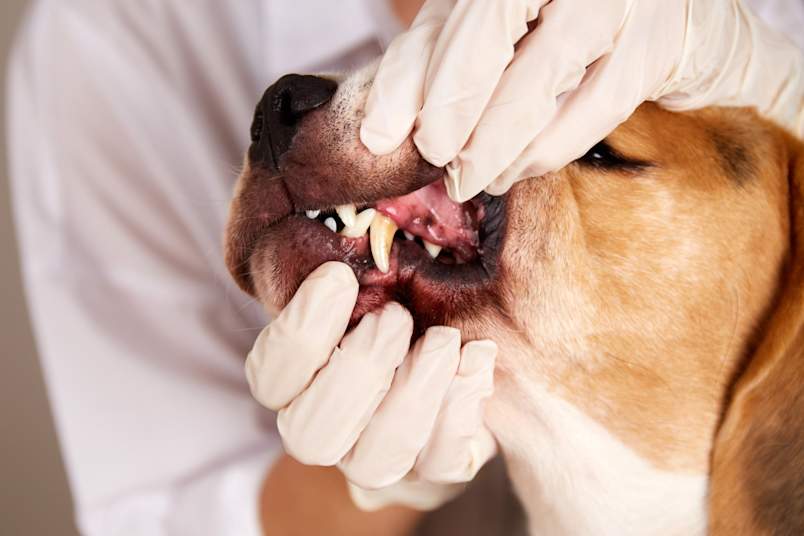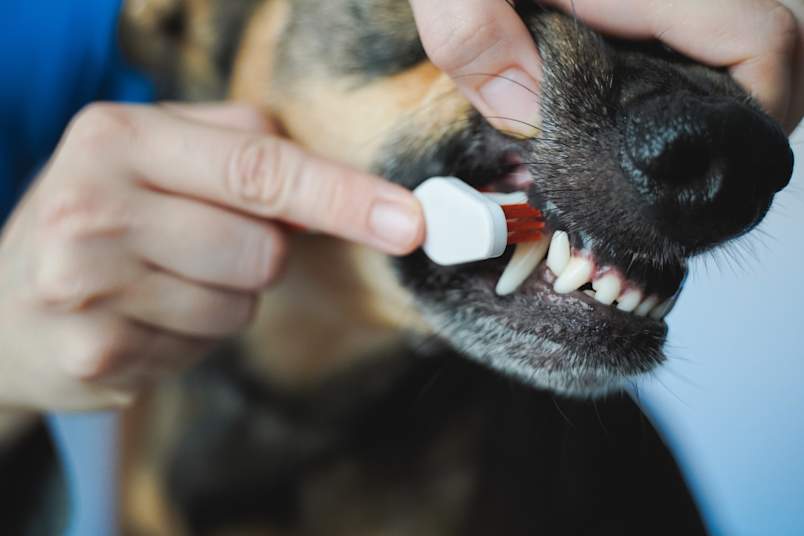
Your dog’s teeth are a window into their overall health. Just like you brush your teeth every day, your furry friend needs regular dental care too. Don't let that scare you – or your dog—teeth cleaning costs less than you might think.
There are measures you can take at home to help prevent plaque from building up on your precious pup’s teeth, such as teeth brushing, water additives or dental chews. However, most dogs end up needing a professional dental cleaning by a veterinarian at least two to three times in their life, many dogs as often as annually.
Your dog’s oral hygiene is connected to their overall health. Mouth bacteria can enter the bloodstream and affect your dog’s internal organs. Dental disease is also linked to an increased risk of heart disease. A professional dental cleaning with a veterinarian is a great way to prolong your dog’s overall health and longevity. Plus, you’ll appreciate the fresh breath!
How often should dogs get their teeth cleaned, you may ask? When it comes to dog dental cleanings, there's no one-size-fits-all answer. It all depends on your furry friend's oral hygiene habits and how well you maintain their teeth at home. For most dogs, their first professional cleaning may not be needed until they're around 6 or 7 years old, but for some dogs, especially smaller breeds, a cleaning as early as 3 years old might be a good idea. Again, the key factor is how much dental care they receive at home.
Factors Influencing a Dog’s Overall Dental Procedure Cost
How much does dog teeth cleaning cost? When it comes to the cost of professional pet dentistry, there are several variables that can impact the overall bill. Just like our own dental bills, the cost can vary depending on the extent of the treatment required.
The severity of periodontal disease is a huge factor. Patients with more tartar and potentially diseased teeth may need longer cleaning and possible extractions. But don't fret, your veterinarian will provide you with a detailed estimate before proceeding with any treatments.
Another factor that can influence cost is who performs the procedure. In general, for a simple dental cleaning with uncomplicated extractions, a general practitioner veterinarian is skilled for the task. There are board-certified veterinary dentists that can perform more complex procedures such as root canals or dental crowns. The average bill for a dental cleaning with a general practitioner vet is around $300-600. The average bill for a dental procedure with a boarded veterinary dentist is closer to $1000-2000 depending on the services provided.
What’s Included in a Dog Teeth Cleaning?
Pet dentistry may seem expensive, but when you really think about all it entails, it may make more sense. Dog teeth cleaning costs cover a wide range of services that are essential for your pet's oral health and overall well-being.
Before you schedule a dental cleaning for your pet, the vet will probably want you to come in for an initial consultation. This allows the veterinarian to evaluate your dog to determine the extent of dental disease present and see if they are well enough to undergo anesthesia. This typically involves some bloodwork and listening to your dog’s heart and lungs to make sure everything is functioning normally. This will give the vet a chance to postpone a dental cleaning to address any other concerns that might come up and make a treatment plan tailored to your precious pup.
On the day of your pet's dental cleaning, your veterinarian will give them a quick checkup to make sure they're in tip-top shape for the procedure. Next, they'll gently help your pet drift off to sleep by placing an intravenous catheter for drug and fluid administration as well as for IV access in case of emergencies. An IV catheter is a thin tube that is inserted into a vein to allow for the administration of fluids and medications. This will make sure they're nice and comfortable throughout the cleaning. While your pet is snoozing, the veterinarian will use a special tube—called an endotracheal tube—to keep their airway open and prevent any water from getting into their lungs. And don't worry, your pet's heart rate, breathing, and other vital signs will be monitored closely the whole time to make sure they're safe and sound.
The dental procedure itself involves removing all tartar both above and below the gumline, on the inside and outside surfaces of the teeth using an ultrasonic cleaner. Once all tartar is removed, the teeth are polished to remove any microscopic scratches on the surface of the teeth, which will help slow the buildup of tartar after the procedure.
Many veterinarians will also do dental X-rays with routine dental cleanings. If you think about it, up to 60% of each tooth is hidden under the gum, so the only way to fully check for bad teeth is to perform advanced imaging. Sometimes teeth that look perfectly normal at the crown can have an abscess at their root which can only be diagnosed with dental radiographs. This would otherwise continue to be a chronic source of discomfort and infection for your pet.

Additional Costs Associated with Dog Dental Procedures
When it comes to the not-so-routine dog dental cleanings, cost can be difficult to estimate. Extractions are often not included, and unfortunately, your veterinarian will not likely be able to tell you what teeth will need to be extracted until after your pup is under anesthesia.
Then they can perform a thorough oral examination, including probing and even dental radiographs. Probing involves using a thin instrument to gently poke around the gums and teeth to check for pockets of infection, while dental X-rays allow the veterinarian to see below the gum line and identify any hidden problems, such as abscesses or tumors.
The price of extractions can vary greatly from $40 to north of $100 per tooth, primarily depending on the number of roots present and their size. For example, incisors and canines both only have a single root, but canine extractions are much more involved because the root is so long. The longer and sturdier a tooth's root, the more challenging and time-consuming the extraction process becomes. This is because the veterinarian needs to carefully maneuver around the root and apply more force to dislodge it from the jawbone. Consequently, canine extractions often require additional expertise and specialized equipment, which contributes to the higher cost.
Medications, such as antibiotics or pain medications, may be necessary after a dental cleaning, especially if extractions are needed. When teeth are cleaned below the gumline or extracted, bacteria can be released into the bloodstream. While typically negligible, in some cases, antibiotics may be necessary to help fight off bacteria left behind after extractions. Pain medications are usually only necessary if extractions are made and will help to make your pet more comfortable eating post-operatively. If you're curious whether "can dogs take tramadol?" or about other pain medications, it is best to consult with your veterinarian, as they can determine the most appropriate and safe option for your pet. Wetting down their normal kibble or feeding canned food for a few days can help as well.
What Risk is Associated with a Dog Dental Cleaning?
While general dental cleanings are a pretty routine procedure, as with any anesthetic procedure there is always a risk associated. This is why the pre-operative physical exam and bloodwork are so important. These help your vet make sure your furry friend is strong enough for anesthesia and lets them take special care based on your pet's unique needs.
Although rare, complications from dog dental cleanings are possible. These can include things such as mild hemorrhage and swelling of gums, especially at extraction sites, and infection. If you are concerned about or have questions regarding these risks, it is best to speak with your veterinarian prior to scheduling for a dental cleaning.
In rare cases, dogs can also experience allergic reactions to anesthesia, which can cause symptoms like hives, vomiting, and difficulty breathing. In even rarer cases, anesthesia can lead to more serious complications, such as heart problems or brain damage. That's why it's so important to make sure your dog is in good health before undergoing any procedure that requires anesthesia.
Even though there are potential risks associated, it's still important to get your dog's teeth cleaned regularly. Dental disease is a common problem in dogs, and it can lead to a number of health problems, including tooth loss, bad breath, and infection. Regular dental cleanings can help to prevent dental disease and keep your dog's teeth healthy.
The benefits of dental cleanings far outweigh the risks. By taking your dog for regular dental checkups and cleanings, you can help to keep them healthy and happy for years to come.
Preventative Measures and At-Home Dental Care for Your Dog
Fortunately, there are measures that can be taken at home to help prevent excessive and fast tartar build up on your dog’s teeth and reduce the time spent under anesthesia. The best way to do so is regular teeth brushing. Surprisingly, many dogs tolerate a quick daily brushing once they get used to it. There are dog specific toothpastes with meaty flavors that can help your pet enjoy the process. For those pets not so amenable to teeth brushing, dental chews and supplements can be considered. They can also be used in addition to regular teeth brushing for multimodal dental maintenance.
Dental chews can work in 2 different ways. The act of chewing on certain materials in certain shapes can help to pull some plaque off your dog’s teeth. Additionally, some dental chews are infused with sealants or other products that help to slow plaque buildup on the teeth. OraVet and Veggident are two great products for reducing plaque on your dog’s teeth. If your dog will not take a dental chew, a water additive containing those same products can be an alternative option.

Pet Insurance and Dog Teeth Cleaning Cost Coverage
Dental accidents and illnesses happen, even to those who receive regular brushings. The need for a routine dental cleaning with your veterinarian is inevitable. Many people may not think about dental insurance for dogs, but our furry friends have 42 teeth—even more than us! Ditch the dental bill blues and opt for dental insurance. It's way better to have peace of mind knowing you're covered when those tooth troubles arise.
With Embrace pet insurance, your dental incidents are covered under the accident and illness coverage. Embrace helps cover the cost of these, from fractured teeth to gingivitis and periodontal disease, and even extractions. Dental accidents and illnesses are covered up to $1000 per policy term. Routine dental cleanings are not directly covered but could be eligible for reimbursement through an optional non-insurance wellness plan. It is important to see dog insurance plans early on to avoid pre-existing conditions that then might not be covered.
Life can throw some unexpected curveballs, and if you find yourself without dental coverage and money is tight, don't despair! There still may be ways to get your furry friend the dental care they need without breaking the bank. Some clinics have third party financing options such as CareCredit or Scratchpay available. These companies pay your veterinarian, and then you pay them over time through set monthly payments. Although this may sound like a great alternative, approval is often dependent on your credit score and not all veterinary clinics offer such options. It is best to be on the safe side and purchase pet insurance for your pup.
Importance of Dog Dental Cleanings
Being proactive in your pet’s dental health is the best way to set them up for a long healthy life. Your pet’s oral hygiene is strongly linked to their systemic health and overall quality of life. Although not all dental issues can be completely prevented, regular teeth brushing is the best way to maintain your pet’s oral hygiene and give them the best chance of keeping all their teeth. Dental chews and supplements can be considered as an adjunct or for pets who don’t tolerate brushing, an alternative. When it comes to accounting for your pet’s oral care, making pet insurance a priority can help protect you and your furry friend from the financial burden that can come with unexpected dental disease.
Remember, your pet is an integral part of your family, and their well-being is paramount. By taking care of their dental health, you're investing in their happiness and longevity, ensuring they continue to bring joy and companionship to your life for many years to come. So, let's team up to keep those pearly whites shining and those tails wagging with delight!